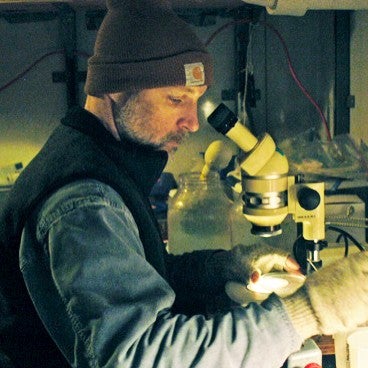- Associate Marine Research Scientist
- Biological oceanography
- Phone: 401.874.6692
- Email: rgcampbell@uri.edu
- Office Location: 203 Aquarium
Biography
Benthic-pelagic coupling, Biology, Climate change, Ecosystem dynamics, Marine habitat and ecosystems, Observational oceanography, Ocean exploration, Plankton ecology, Polar processes, Suboxic ecology, Zooplankton ecology, Zooplankton distribution
Research
Zooplankton are mostly very small (microscopic) animals that are the key link between the primary producers (single celled plants) at the bottom of the food chain and higher trophic level animals including fish, birds and marine mammals. Anything that disrupts this link, such as changes in climate, could have serious negative consequences for marine ecosystems and for economically important fisheries. I study the role that zooplankton play in marine ecosystems and how they interact with their environment. To do this, I measure the rates that control their population dynamics such as feeding, growth, and reproduction. I quantify these rates under controlled conditions in the laboratory and under natural conditions in the field. I use both traditional experimental approaches and new molecular methods to estimate the rates, and recently I have been using genetics to study population distributions.
I have worked in ocean environments that range from estuaries to ocean basins and from temperate to Arctic regions in all seasons, collaborating with colleagues from the GSO and many other oceanographic institutions. I have studied the importance of zooplankton in marine ecosystems with commercially valuable fish stocks, such as Georges Bank. I have looked at their role in harmful algal blooms, both in controlling these blooms through grazing and in concentrating and transferring algal toxins to higher trophic levels. With colleagues from the GSO, I helped evaluate a treatment system to eradicate invasive species, including zooplankton, in ship’s ballast water tanks.
Much of my recent research has had an Arctic focus. I have worked on over a dozen funded research projects in the last 15 years studying the role of zooplankton in Arctic and subarctic marine ecosystems. I began in the late 1990s with a project to study zooplankton life cycles and productivity from an ice camp in the Canada Basin located in the central Arctic Ocean. I visited the camp throughout the year to sample through the ice and conduct on-ice experiments. Since then I have worked on multiple projects in the eastern Bering Sea, which produces almost half of the annual U.S. fish catch, and the Arctic Chukchi and Beaufort Seas, which have seen dramatic physical changes in recent years including warmer water temperatures and reductions in sea ice. I have quantified the productivity of zooplankton and investigated their role in energy transfer and carbon export in these systems. I have worked with interdisciplinary teams of scientists that included oceanographers, modelers, and social scientists to explore linkages between the atmosphere, ocean, and human components of the northern Alaskan coastal system, where the formation of zooplankton patches (prey for bowhead whales), bowhead whale migration routes and timing, and successful Iñupiat whale hunting are influenced by oceanic conditions. We found that the system, although resilient, is still vulnerable to environmental and human generated change. This study has led to a number of projects that have allowed us to monitor the oceanographic conditions near Barrow, AK for almost 10 years. Recently, I participated in the first scientific winter expedition to the western Arctic shelves in the modern era to try to better understand how zooplankton survive the winter in these cold, dark, ice-covered seas. A lack of sampling during the winter has hindered our ability to understand how these ecosystems will respond to future climate change. And finally, I have worked with ecosystem modelers to develop realistic plankton food-web models, so that these models can be used to better understand the ecosystem, inform new research directions, guide marine policy, and predict the future states of these ecosystems under different climate change scenarios.
Education
Ph.D. Oceanography, University of Rhode Island 1993
B.S Natural Resources, University of Rhode Island 1981

